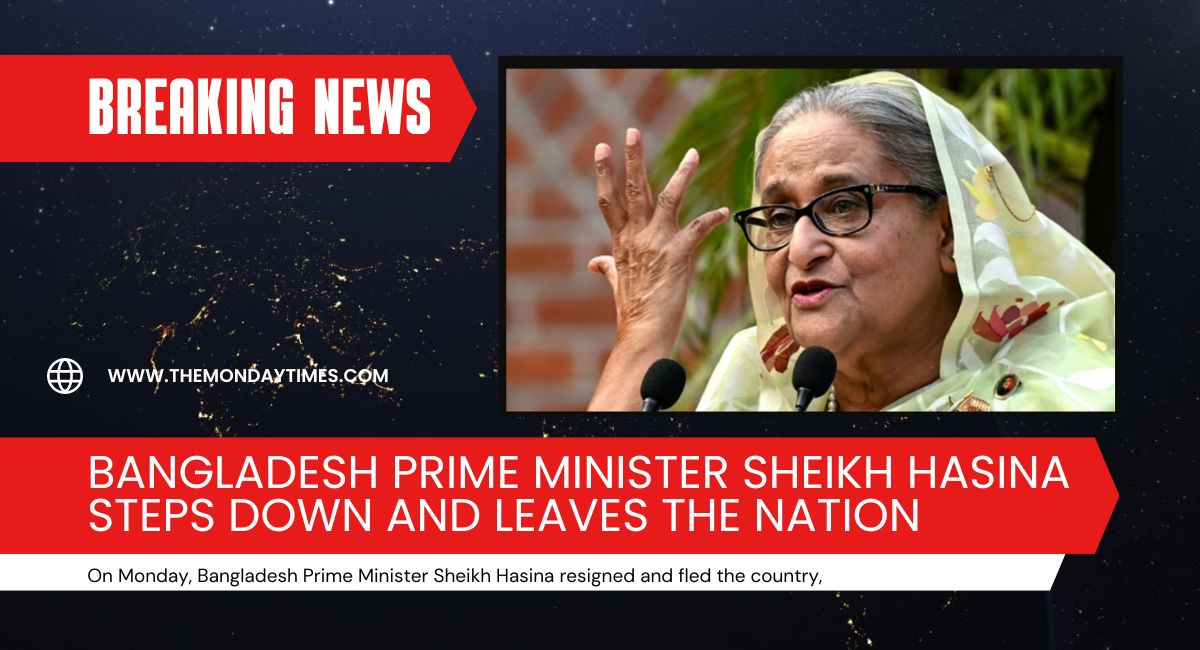Breaking News: Bangladesh Prime Minister Sheikh Hasina Steps Down and Leaves the Nation
Bangladesh’s Prime Minister Sheikh Hasina on Monday resigned and fled the country after a day of unrest on Sunday in which about 1000 of people were killed.
In a sudden and dramatic development, Sheikh Hasina has resigned as Bangladesh’s Prime Minister and has left the country. The announcement came amidst escalating nationwide protests and civil unrest.
In a televised statement earlier today, Hasina confirmed her resignation and her departure from Dhaka for a “safe location,” with preliminary reports indicating that she may have traveled to neighboring India. Her resignation marks the end of a 15-year tenure that has seen both significant economic development and ongoing controversies.
The resignation follows days of intense demonstrations, with thousands of protesters defying a nationwide curfew and storming her official residence in the capital. The violence and unrest have resulted in a communications blackout, curfews, and multiple casualties.
Bangladesh’s military chief, Waker-Uz-Zaman, has announced that he is now assuming control of the country. In his address, Zaman stated, “This is a critical time for our nation. I will seek the president’s approval to form an interim government to manage the country’s affairs.” He also promised that the military would cease further violence and that an investigation into recent crackdowns would be launched.
Zaman urged citizens to remain calm and cooperate with authorities during this transition period. He emphasized that no further firing by the army or police would be tolerated and pledged a thorough investigation into the recent violent incidents.
The situation remains fluid, with widespread reactions from both domestic and international communities. The world is closely watching the developments in Bangladesh as the country navigates this unprecedented political shift.
 angladesh Prime Minister Sheikh Hasina has stepped down and left the country, bringing her 15-year leadership to an end. Her departure followed intense protests and unrest, during which thousands defied a nationwide curfew and stormed her official residence.
angladesh Prime Minister Sheikh Hasina has stepped down and left the country, bringing her 15-year leadership to an end. Her departure followed intense protests and unrest, during which thousands defied a nationwide curfew and stormed her official residence.
In a televised address, Bangladesh’s military chief, Waker-Uz-Zaman, announced he would assume control at this “critical time for our country.” He confirmed that Hasina had departed Dhaka for a “place of safety,” with reports indicating that she may have traveled to neighboring India.
Zaman stated, “I am taking responsibility now and will request the president to establish an interim government to manage the country during this period.” He also assured that the army would be de-escalating its actions and an investigation into the violent crackdowns, which have fueled public outrage, would be conducted.
He added, “We will thoroughly investigate all incidents of violence and hold those responsible accountable. No further firing will be permitted by the army or police.” Zaman called for students and citizens to remain calm and support the transition.
Following Hasina’s resignation, celebrations erupted in Dhaka, with crowds filling the streets and storming her residence. Protesters were seen making victory signs and removing household items from the official residence.
Hasina had been in power since 2009 and was re-elected for a fourth consecutive term in January. The election, which was marred by a boycott from major opposition parties, raised questions about its fairness. Bangladesh Prime Minister Sheikh Hasina
The unrest began with peaceful student-led protests in July, demanding reforms to the government job quota system. The situation escalated into violent clashes with security forces, leading to a communications blackout, curfews, and around 300 deaths. The protests eventually evolved from calls for reform into a movement demanding Hasina’s removal.
On Monday, Bangladesh Prime Minister Sheikh Hasina resigned and fled the country, Bangladesh Prime Minister Sheikh Hasina- news